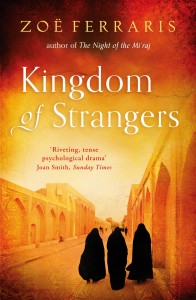 Published by Little Brown 7 June 2012
Published by Little Brown 7 June 2012
320pp, trade paperback, £12.99
Reviewed by Jessica Mann
In the desert outside Jeddah a secret grave is unearthed containing the mutilated bodies of nineteen women, each of them missing one hand. It seems that a serial killer has been at work for years, but because his victims were young Asian immigrants, nobody noticed. Lieutenant-Colonel Inspector Ibrahim Zahrani is in charge of the investigation but is distracted by a personal problem, the disappearance of his mistress. He is a dutiful husband and devoted father whose illicit relationship is a deadly secret, not for the usual western reasons but because in Saudi Arabia adultery is a crime for which the penalty is death. So he cannot openly search or make any enquiries himself and turns for help to one of Jeddah’s very few policewomen.
Katya, the forensic technician who appeared in Ferraris’s previous two books, The Night of the Mi’raj and City of Veils, is permitted to work in the police lab because it is entirely staffed by women. Of course a man may not touch a woman’s body even in death, so the chief medical examiner will not get personally involved even in this case of mass murder. Katya, dreaming of promotion to proper detective work, is only too willing to help Ibrahim, in spite of the disapproval of her colleagues and family. They would be appalled to know what dangers she faces, on the trail of criminals who traffic in human beings.
One of the fascinating aspects of this novel is the tension between Katya’s acceptance of the customs she grew up with and her rebellion against some – but only some – of the restrictions on her behaviour. She is always aware that officials are on the look-out to prevent ‘virtue crimes’. She takes for granted that she must hide her face and may not drive a car, so her suitor Nayir must chauffeur her when she goes out. She wants to marry Nayir despite his uneasiness about her unconventional profession.
In terms of detective fiction, this is a well planned, carefully unfolded and absorbing tale. The mass murder of women, all imported from the Philippines as servants and treated like slaves, is eventually solved. So is the disappearance and death of Ibrahim’s secret lover. But Zoe Ferraris gives readers far more than good prose and an elegant plot.
In an eye-opening expose of an inscrutable society she shows how people live and can be happy in circumstances which must seem impossibly constraining to most western readers. The brutality of Saudi’s capital and corporal punishments, the horror of its restrictions on women, the capriciousness of its powerful officials, all add up to a nightmare. Yet in portraying the lives of women in this closed, complex culture, we are shown not only the almost inevitable misery but also the possibility of joy and love. This gripping mystery is also an excellent novel.
